Bread - it's the staff of life. It has become a symbol
of both individual and community welfare. | 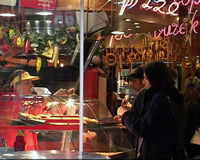
|
For the Belgian Puratos Group, bread means business on a global scale. Puratos produces ingredients for bread, cakes and chocolates. This 80 year old company has continuously expanded to be active today in 108 countries. In recent years, Puratos has invested in countries of Eastern Europe, and especially in South Eastern Europe, opening factories in Romania, Bulgaria, Moldova and Yugoslavia. | 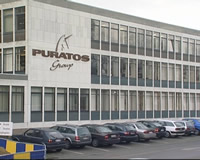
|
Serge Ameye is the manager who opened up this part of the world to Puratos. He saw a potential in South East Europe, at times when most investors wouldn't even have dared to think of investing money there. | 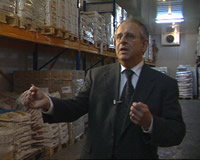
|
Interview Serge Ameye, Manager for Eastern Europe, Puratos ` Our group can appreciate to what extent it is important to be, if possible, the first in a given market. And we know that by being the first to enter the market, we have an advantage on our competitors, that is a fact. In addition, our group has the duty to continue to grow, and is very conscious of the fact that in the future, one has to be in the emerging markets, where consumption is still at lower levels, and will increase in the years to come ` This business philosophy was also based on some long-standing personal contacts. Back in the seventies, Serge Ameye met a certain Mr Misic, who was running a Macedonian company in the then former Yugoslavia. Mr. Misic was interested in Puratos' products. | 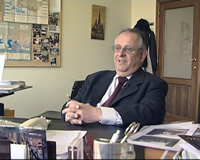
|
Interview Serge Ameye ` One day, this Mr Misic did me a great pleasure, and he brought his son who at that time was fifteen, and spoke English fluently. From then on our headache was over, we could exchange ideas, and since then our business relation took a new turn and it became very interesting `. | 
|
Serge:
`Hey brother, how are you?` Over the years, Serge picked up some words from his partner. The boy who was fifteen when they first met, Nebojsa Misic, is today running Puratos in Serbia. Mutual trust helped the business survive the harsh times of war and sanctions. | 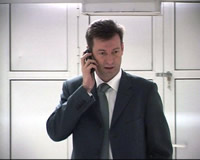
|
Interview Nebojša Mišic, Manager Puratos Serbia `I never had a problem to call Puratos, even at the time when you couldn't obtain raw material, and we managed to get it for the production to go on and we would pay when it was possible.` | 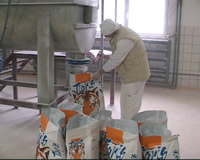
|
But this was the past. Puratos Serbia is today one of the most profitable production units in the group. However, certain absurdities still persist. Though perfectly capable of supplying the whole region, Puratos Serbia cannot sell its goods in neighboring Croatia, because of high customs barriers between the two countries. The absurdity does not end here. Instead of bringing its products made in Serbia directly to Croatia, it is cheaper for Puratos to cover the Croatian market from Belgium, which is more than thousand kilometers away… | 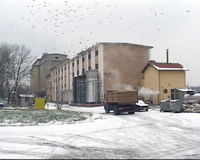

|
Interview Nebojša Mišic `As soon as the customs barriers will be lifted, and when the measures a country usually takes to protect its economy will be removed, then we will automatically enter all the markets and compete on equal footing with domestic firms.` | 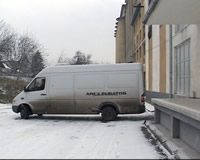
|
But until the governments remove customs and other barriers, this is how the circulation of people and goods in the region will look like - kilometers of truck jams and a struggle to get indispensable visas in passports. Small, closed and fragmented markets are an obstacle not only to trade, but also to major foreign investments. | 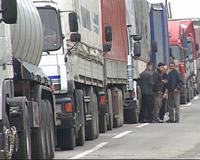
|
Here in Zagreb businessmen know that trade barriers in the region are a hindrance to the economy. Although there are also some psychological barriers still in place, Croatian exporters see their opportunities on neighboring markets, where their products are known and wanted. That is why Croatia has signed a free trade agreement with Serbia and Montenegro, coming into effect in 2003. | 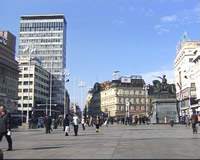
|
Interview Olgica Spevec, Deputy Minister of Economy, Croatia `I can tell you that, after this agreement was signed in the Ministry on November 11 this year, we had a deluge of phone calls and emails from Croatian companies wanting to know when the agreement would be implemented. We are aware that, of all the agreements we have signed so far, this one is by far the most interesting for the business community.` | 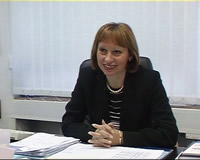
|
The driving force behind this process is the Stability Pact. At a conference in Belgrade, eight countries of Southeastern Europe confirmed their commitment to free trade. The agreement between Croatia and Serbia and Montenegro is just one piece in a regional network of trade agreements, which all countries must sign by the end of January. It's now up to governments to remove the remaining obstacles.
| 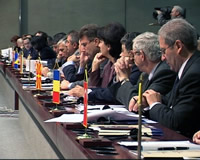
|
The role of Stability Pact is to bring them around the same table. | |
Interview Erhard Busek, Special Co-ordinator of the Stability Pact for South Eastern Europe `Politics has to take leadership and to show in which direction it goes and business is always very realistic - they are coming where they can earn money. What we need here is implementation from the agreements down to earth, that administration is working in the right way, that legislation is not always changed, that courts are working - a lot of things have to be done.` | 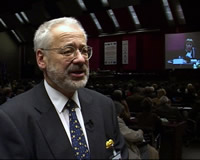
|
Interview Goran Pitic, Minister of Foreign trade, Serbia `That means serious competition, that means breaking the monopolies, that means that the prices of certain goods, imposed by monopolies, will be seriously challenged. I think it is a great thing that will lead us to the door of our ultimate objective and that is the EU.` | 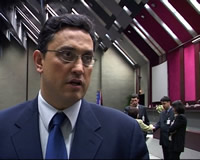
|
| On January 1st 2003, it's been exactly ten years since the EU fully liberalised its market. The benefits are obvious. Today, a similar perspective opens up for the Southeastern part of the continent. | 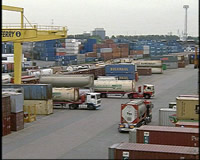
|
| Free trade agreements, as statements of political willingness, are only the beginning of a process that should transform South East Europe in a single market of 55 million people. | |
This is Bucharest, the capital of Romania. Here too, Puratos is the market leader in bakery products. And here too, it faces absurd obstacles. Exports are possible from Romania to the EU, but not from Romania to Bulgaria, a border only 60 kilometers away from Bucharest. Serge Ameye says trade liberalization will be key to the growth of his business. Puratos' intention is not to cover the whole region out of a single factory, but to develop complementary production units in different countries. | 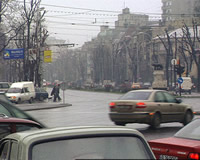
|
Interview Serge Ameye ` In reality this region is so big and populated that almost everybody will need to establish more than one production unit. What a company does, when it is possible, is create complementary factories. Ideally trucks which are going somewhere should not come back empty, but they should come back with another product. As such a synergy between different activities in one region can be created. ` According to WTO standards, if a given country trades less than 50% with its immediate neighbors, it is a clear sign of a problematic situation. | 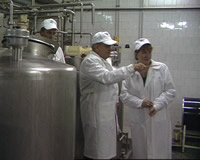
|
But, as a pre-condition to trade, a certain level of infrastructure should be in place. The manager of Puratos Romania explains how it is more difficult for her to go to Belgrade, the capital of her neighboring country, than to any other place in the world. | 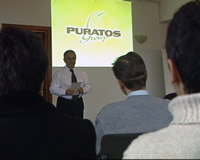
|
Interview Marilena Maritescu, Manager Puratos Romania `If one wants to get to Belgrade from here, he should be best travelling by car, because if you take the plane, it takes many hours - you first have to travel to Timisoara, and then again take the car. When I tried to get to Belgrade directly by plane, it was impossible. I had to fly with Swissair to Zurich, wait five hours there and then get on a flight to Belgrade. That's twelve hours in total.` | 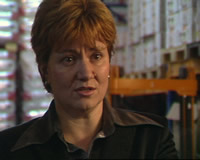
|
| Nevertheless, the perspective of a common market makes the region attractive. At an investors' conference in Brussels, Serbian Prime Minister Zoran Djindjic said that South East Europe was the last big market in Europe to which investments are yet to arrive. | 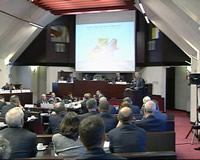
|
Interview Zoran Djindjic, Prime Minister, Serbia `That is an exception: today in the world, you don't have any other market with such a potential and where there is still no big business. Business has been hindered by wars. Today, the wars are over and now we have an opportunity for a fresh start on a market that in the next ten years will be very dynamic.` | 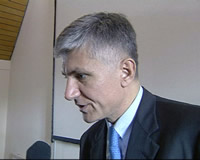
|
Interview Michael Holm Johansen
The Coca-Cola Company `Going forward from here it is going to be important to create a sort of free trade zone among all these countries. This would significantly improve the wealth of consumers for sure and will also benefit the businesses. We are looking forward to use our factories to supply different markets and that is not necessarily possible at the moment.` | 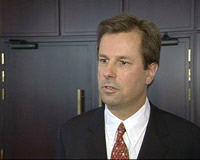
|
| Free trade leads to new foreign investment, as demonstrated by the Puratos experience. Serge Ameye and his Romanian partners have a reason to celebrate today: they were among the first to seize the opportunity… | 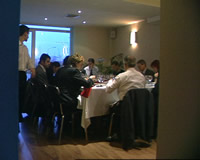
|
Interview Serge Ameye, Puratos ` I think I can say honestly that things are much easier and less risky today than they were 3-4 years ago. The road has been opened, and we are not the only ones, there are already other serious investors, and if we can have success, why not many others ? ` | 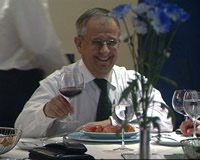
|
 Facebook
Facebook Twitter
Twitter





























